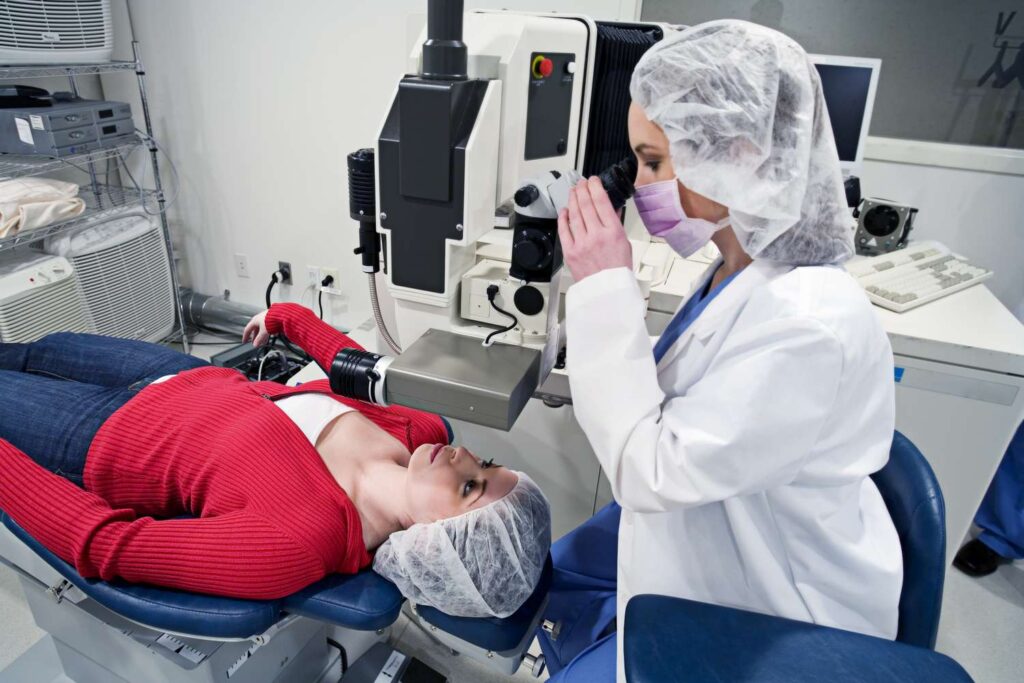Are you tired of relying on glasses or contact lenses to correct your vision? Considered Lasik eye surgery as a potential solution? This article will delve into the world of Lasik surgery to help you determine if it’s the right choice for you.
Understanding Lasik Eye Surgery
Lasik eye surgery is a promising solution for those seeking visual improvement and freedom from glasses or contacts. Understanding the procedure, weighing its benefits against the potential risks, and ensuring your eligibility are crucial steps towards making an informed decision. With proper preparation and a skilled surgeon, eye surgery lasik has the potential to provide you with clearer vision and an improved quality of life.
Lasik, which stands for Laser-Assisted In Situ Keratomileusis, is a popular refractive surgery procedure aimed at correcting common vision problems such as nearsightedness, farsightedness, and astigmatism. It involves reshaping the cornea, the clear front surface of the eye, to improve visual acuity and reduce the reliance on visual aids.

The Basics of Lasik
The Lasik procedure starts with numbing the eye with anesthetic eye drops to ensure a painless experience. The surgeon then creates a thin, hinged flap on the cornea using a microkeratome or a femtosecond laser. This flap is lifted to expose the underlying corneal tissue.
Next, an excimer laser is used to precisely remove microscopic amounts of corneal tissue. This reshaping process aims to correct the specific vision problem that needs to be addressed. Finally, the surgeon repositions the corneal flap, which quickly adheres without the need for stitches.
It is important to note that Lasik surgery is not suitable for everyone. Candidates must meet specific criteria to ensure the procedure’s effectiveness and safety. Factors such as age, overall eye health, and stability of vision play a crucial role in determining candidacy for Lasik.
Additionally, the recovery process after Lasik surgery is relatively quick for most patients. While some may experience mild discomfort or temporary vision fluctuations, the majority of individuals notice a significant improvement in their vision within a few days. It is essential to follow post-operative care instructions provided by the surgeon to promote proper healing and optimal results.
Benefits of Lasik Eye Surgery
Lasik eye surgery offers numerous benefits to those seeking visual improvement and freedom from their glasses or contacts.
For individuals with active lifestyles or careers that require clear vision, Lasik can be a game-changer. Imagine being able to wake up and see clearly without reaching for your glasses or fumbling with your contacts. Lasik provides the freedom to engage in activities like swimming, hiking, or playing sports without the hindrance of corrective eyewear.
Vision Improvement
One of the most significant benefits of Lasik is the potential for improved vision. Many patients experience a significant reduction in their dependence on glasses or contacts, often achieving 20/20 vision or better.
Furthermore, Lasik can correct a range of vision problems, including nearsightedness, farsightedness, and astigmatism. This versatility makes it a popular choice for individuals looking to address multiple vision issues with a single procedure. Read about ways to improve and protect your vision at https://www.health.harvard.edu/staying-healthy/6-ways-to-improve-and-protect-your-vision
Long-term Benefits
Another advantage of Lasik is its long-lasting nature. In many cases, the results of the surgery are permanent, allowing patients to enjoy clear vision without the hassle of constant optical aids.
Moreover, the recovery time for Lasik is relatively short, with many patients experiencing improved vision within a few days of the procedure. This quick turnaround means minimal disruption to daily activities and a swift return to normal life with enhanced vision.
Potential Risks and Complications
Although Lasik has proven to be a safe and effective procedure for many individuals, it’s crucial to consider the potential risks and complications involved. Understanding these risks can help you make an informed decision about whether Lasik is the right choice for you.
Lasik surgery, like any medical procedure, comes with its own set of risks and possible complications. While the majority of patients experience improved vision and satisfaction with the results, it’s important to be aware of all potential outcomes.
Short-term Side Effects
After undergoing Lasik surgery, some patients may experience short-term side effects such as dryness, glare, halos around lights, and temporary visual disturbances. These typically resolve within a few days or weeks as the eyes heal. Your surgeon will provide you with detailed instructions on how to manage these side effects and ensure a smooth recovery process.
It’s common for patients to experience some discomfort or fluctuations in vision during the initial healing period. This is a normal part of the recovery process as your eyes adjust to their new shape. Following post-operative care guidelines and attending follow-up appointments are crucial in monitoring and managing these short-term side effects.
Long-term Risks
In rare cases, long-term risks may include dry eyes, regression of the initial correction, or the need for additional enhancements in rare cases. It’s essential to discuss these risks with your surgeon to fully understand the potential outcomes. Your surgeon will evaluate your individual case and provide personalized recommendations to minimize the chances of experiencing these long-term risks.
While the likelihood of experiencing severe complications from Lasik surgery is low, it’s important to weigh the potential risks against the benefits of improved vision. By maintaining open communication with your surgeon and following all pre and post-operative instructions, you can increase the likelihood of a successful outcome and minimize the risks associated with Lasik surgery.
Determining Your Eligibility for Lasik
Not everyone is a suitable candidate for Lasik surgery. Several factors come into play when determining eligibility.
Lasik surgery, a popular method for correcting vision, is a life-changing procedure that can provide clear eyesight without the need for glasses or contact lenses. However, before undergoing this surgery, it is essential to assess your eligibility based on various criteria.
Health Considerations
Your overall health, in addition to the health of your eyes, plays a vital role in deciding if Lasik is right for you. Certain medical conditions, such as autoimmune disorders or unstable diabetes, may disqualify you from the surgery.
Furthermore, it is crucial to inform your eye surgeon about any medications you are taking, as some drugs can impact the healing process after Lasik. Additionally, a history of eye infections or injuries may also affect your eligibility for the surgery.
Age and Lasik Surgery
Age is another crucial factor to consider. Lasik is typically recommended for individuals over 18, as the eyes tend to stabilize by then. However, the decision ultimately depends on the stability of your prescription.
It is important to note that while age is a significant factor, individuals over 40 may still be eligible for Lasik, especially if they have had a stable prescription for at least two years. Your eye surgeon will evaluate your specific case to determine the most suitable course of action.
Preparing for Lasik Eye Surgery
Once you’ve determined your eligibility for Lasik, proper preparation is key to ensure a smooth experience.
Lasik eye surgery is a life-changing procedure that can significantly improve your vision and quality of life. Before undergoing this surgery, it is essential to understand the process and make necessary preparations to ensure a successful outcome. To learn more about how to prepare for lasik eye surgery click here.

Consultation and Evaluation
Your journey to Lasik begins with a consultation with an experienced eye surgeon. During this appointment, your eyes will be thoroughly examined, and your medical history will be evaluated to determine the best course of action.
It is crucial to be honest and thorough when providing information about your medical history and current eye health. This will help the surgeon assess your eligibility for the procedure and develop a personalized treatment plan tailored to your specific needs.
Additionally, the surgeon will discuss the procedure, answer any questions or concerns you might have, and provide specific instructions for the pre-surgery period.
What to Expect on Surgery Day
Arriving at the surgical center on the designated day, you can expect a swift and well-coordinated process. The surgery itself typically lasts less than 30 minutes per eye, and you will be able to return home shortly after.
During the surgery, you will be awake, but your eye will be numbed with eye drops to ensure your comfort. The surgeon will use a laser to reshape your cornea, correcting your vision and reducing your dependence on glasses or contact lenses.
After the procedure, your surgeon will provide post-operative instructions and likely schedule a follow-up appointment to monitor your progress.
It is normal to experience some discomfort, dryness, or blurry vision in the days following the surgery. However, these symptoms should gradually improve as your eyes heal. It is essential to follow your surgeon’s instructions carefully and attend all follow-up appointments to ensure proper healing and optimal results.
Related : How to Prepare for Cataract Surgery: A Comprehensive Guide

